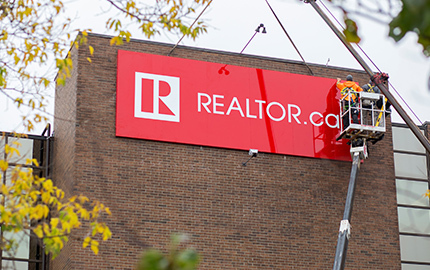Editor’s note, Oct. 24: CREA confirmed that 77.24 per cent of votes were in favour of transitioning Realtor.ca into a wholly-owned taxable subsidiary of CREA.
Today, the Canadian Real Estate Association (CREA) held a special general meeting (SGM) in Ottawa where members voted in favour of transitioning Realtor.ca into a wholly-owned taxable subsidiary of CREA.
The platform has been operating on a not-for-profit basis to this point.
“This decision represents a forward-thinking approach that reflects the evolving needs of both Realtors and consumers. By transitioning Realtor.ca into a wholly owned subsidiary, 100 per cent owned by CREA, we’re unlocking new opportunities for innovation and growth while ensuring Realtors remain at the heart of the platform,” says Janice Myers, CREA CEO.
The case for the structure change
For the past 18 months, CREA has been engaging the Realtor association community to discuss what the future of Realtor.ca looks like and the potential to make this change, as it deems it a “financial necessity and strategic move to secure Realtors at the centre of Canadian home buying, selling and renting journeys.”
CREA points out that Realtor.ca has largely created how real estate is marketed and consumed in Canada but says the status quo isn’t sustainable because competition in tech grows each year, consumers expect more and operational costs increase.
Specifically, the organization notes that Realtor.ca can’t pursue new revenue streams or engage in some business-related activities. A for-profit model would offer the ability to change this and better position CREA to succeed in a competitive market.
PricewaterhouseCoopers (PwC) conducted an analysis and presented opportunities the transition could offer in a draft business case.
It found that as a taxable entity, Realtor.ca could generate significant estimated revenues to help reduce dependence on CREA funding from member dues. Specifically, over a 10-year period, member dues funding Realtor.ca would drop from 43 per cent to 25 per cent, allowing CREA to focus on advocacy and professionalism.
Dues wouldn’t necessarily decrease, but these funds could go toward priorities other than Realtor.ca.
Proposed focus
In a previous interview with REM, Myers emphasized the focus is on maintaining control while enhancing the platform’s capabilities and ensuring it continues to meet the evolving needs of both consumers and Realtors. She highlighted three main points solidified by a special task force and endorsed at an SGM:
1. Ownership. Realtor.ca will remain wholly owned by CREA, ensuring that Realtors retain ownership through their membership.
2. Governance. The platform will be managed with an independent board and as a taxable entity, allowing for greater operational flexibility.
3. Revenue reinvestment. Any profit generated will be reinvested back into the platform for the benefit of Realtors and consumers alike.
“Today’s vote is about securing the future of Realtor.ca. Every day, Realtors proudly serve clients in every corner of the country. This decision will help ensure Realtor.ca continues to meet the needs and expectations of today’s property owners, buyers, sellers and renters,” says James Mabey, CREA chair.
“We’re excited about the future of Realtor.ca and grateful for the trust and support of our members as we take this important step,” Myers adds.
Photo: CREA
















Interesting…going from non-profit to profit is always a challenging direction.
I wonder, will Realtor members get stake in the upcoming ‘”For Profit” structure? Perhaps based on their financial contribution in support of Realtor.ca over the years as paying members would make sense.
No stakes, no shares. The only shareholder is CREA and there are no external investors. This was mandated by a taskforce that represents REALTORS. Did they miss the mark?
No, because it is not anticipated to be profitable at least for the first 10 years.
“PricewaterhouseCoopers (PwC) conducted an analysis and presented opportunities the transition could offer in a draft business case.
It found that as a taxable entity, Realtor.ca could generate significant estimated revenues to help reduce dependence on CREA funding from member dues. Specifically, over a 10-year period, member dues funding Realtor.ca would drop from 43 per cent to 25 per cent, allowing CREA to focus on advocacy and professionalism.”
If REALTOR.CA still needs 25% of membership due from CREA in 10 years, it means it is not going to be profitable in 10 years. Whatever they make, they will try to spend it on growth.
This was due, this change is needed for Realtor.ca as well as CREA to move forward. It will be interesting and exciting to see our Industry evolve and change again for the better. Great job CREA and congratulations to Realtor.ca
I hope this works, I really do. But I have concerns:
a) Revenue Risk – the business case indicates about $13 million will be generated in the first year from ancillary services such as selling mortgage leads. If I assume that Realtor.ca will earn 0.10% of every funded mortgage referred, they’ll need to collect on $13 billion of mortgage referrals. If I further assume a $500,000 average mortgage, Realtor.ca will need to earn fees on 26,000 referrals.
Last year there were 443,511 residential resales in Canada. If a quarter of these were cash sales, then around 8% of all resale mortgages in the country will need to flow through Realtor.ca for their forecast to fly.
This seems optimistic, especially given the disproportionate share of new mortgages held by the big 6 banks (and a handful of other large lenders) who have well established acquisition channels. The new lead generation machine will be one of many options for these big players. CREA’s plan might work, but $13 million in year one doesn’t seem like a very “conservative” forecast.
b) Conflicts – since TRREB, CREB, and many other realtor groups also have digital dreams, it’s unclear to me who does what in the brave new world. Perhaps MOUs could be signed to minimize overlap, but this risk needs to be carefully managed from the outset. Is it?
c) Contingency Plans – what if the model fails? Turning to an outside investor for a cash infusion is one likely option. At least that’s what happened in the Netherlands last February when Dutch agents sold off 24% of their portal to General Atlantic, an American growth investment giant with fingers in a lot of European pies. Yes I know that’s not technically allowed under the new model. However in a “crisis” things can change pretty rapidly.
d) Timid Vision – with so many transformative changes impacting the residential real estate world it’s hard not to be disappointed by the plan. Monetization is all and good, but is this really the best you can come up with? How about transforming Realtor.ca into an optional auction site rather than relying upon some bankrupt Australian company to provide a vague increase in transparency? Or if you really want a challenge, how about incorporating identity verification, payment processing and offer management into the site so vetted Canadians and their realtors can safely and quickly buy and sell homes. If done right this could seriously dent money laundering, virtually eliminate the need for FINTRAC and give a much needed boost to our sector’s credibility.
I could go on, but I’ll stop with one final observation. After being bushwhacked by OREA’s 700% dues increase last year, the idea of a $254 CREA fee hike -SPREAD OVER A DECADE – doesn’t seem like anything to get worried about. In fact, I’d be more than happy to transfer OREA’s ill gotten gains to your much nobler cause if it meant we could keep Realtor.ca out of the hands of the Murdocks and Zillows of the world.
test of catcha
Well, we certainly live in interesting times. On the surface, moving realtor.ca to a for profit entity seems a sound, logical move. We are competing against some very big players who create and re-invest profits to their gain and our loss.
I am, though, concerned about the ability of the management of the new entity being able to run the endeavour as they see best. They are still under ultimate control of CREA and not for profit entities do not have a stellar record of running for profit businesses.